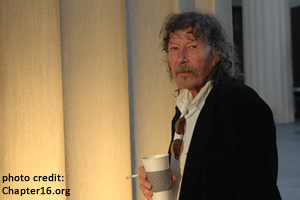February 24, 2012 Novelist William Gay died at his home in Hohenwald, Tennessee, last night, at age sixty-eight. Among the most critically acclaimed of his generation of Southern writers, Gay began his public writing career famously late, when, at age fifty-five, his first short story was published in The Georgia Review. His first novel, The Long Home, won the James A. Michener Memorial Prize and was named a New York Times Notable Book for 1999. He followed that success with another novel, Provinces of Night, a short-story collection, I Hate to See That Evening Sun Go Down, and a third novel, Twilight.
Gay was frequently named by critics as the natural heir of Southern writers famed for mining specific locales; he was most often compared to Cormac McCarthy and William Faulkner. Gay acknowledged the influence of McCarthy, in particular, on his writing, and of William Faulkner’s Yoknapatawpha County on Ackerman’s Field, Tennessee, the setting for all or part of each of his books. Gay was also a well-known music lover and frequently wrote about music for magazines and anthologies, including The Oxford American, Paste, and others.
 Although he began writing as a teenager, Gay served in the U.S. Navy for four years and then spent his working life in construction, painting and hanging drywall before his writing career bore fruit. Just as every writer is first and most importantly an observer, Gay used those years to watch and to listen, developing talents which contributed to an uncanny ear for dialogue, a sharp appreciation for the absurd—both humorous and tragic—and a style that described, simply and lyrically, the Tennessee countryside in which he lived for most of his life.
Although he began writing as a teenager, Gay served in the U.S. Navy for four years and then spent his working life in construction, painting and hanging drywall before his writing career bore fruit. Just as every writer is first and most importantly an observer, Gay used those years to watch and to listen, developing talents which contributed to an uncanny ear for dialogue, a sharp appreciation for the absurd—both humorous and tragic—and a style that described, simply and lyrically, the Tennessee countryside in which he lived for most of his life.
Gay’s last book, The Lost Country, is not yet published, but in 2009 he allowed Chapter 16 to publish an excerpt from the novel, and he discussed his writing in a companion Q&A. He spoke in that interview about what it meant to him to become a professional writer:
[Literary success] is like a crap shoot. Like rolling the dice. Sometimes it works and sometimes it doesn’t. I don’t really understand it. But I’m a little superstitious about it. If I start looking for an explanation, it’ll all go away. What I wanted to be most in life was a writer, and it sometimes seems unreal that that’s what I am. I’m not saying I’m famous, but I have published stuff, and readers know who I am. I never considered myself a writer before I actually got paid for it. The way I looked at it, if someone eventually paid you, even fifteen cents, if they saw any monetary value, you were a writer. As long as you were sending stuff out, getting it back, that was like trying to be a writer.
We at Chapter 16, Humanities Tennessee, and throughout the writing community in Tennessee are thinking now of Gay’s family, his four children and his grandchildren, and of his many friends, who are legion and heartbroken. Check Chapter 16 next week for a fuller tribute from the writing community Gay leaves behind.
To read a biography of William Gay by Randy Mackin of the Tennessee Literary Project, click here. For more updates on Tennessee authors, please visit Chapter 16’s News & Notes page, here.
Tagged: Fiction





